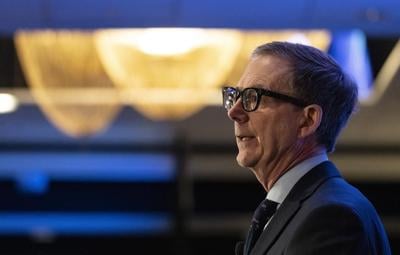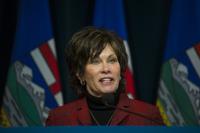An online advertisement features video of Bank of Canada governor Tiff Macklem promoting an investment opportunity as a joint venture between the central bank and U.S. businessman Elon Musk. The ad points viewers to a website that touts profit of up to $2,200 daily through the site's advanced crypto software. The video is a digitally altered fake. Macklem did not announce such a joint venture and has no involvement with the scheme.
The , crafted to resemble a news program segment, begins with a CBC journalist introducing Macklem's announcement.
In the following clip, Macklem appears to say: "Given the current realities, including high taxes, food prices, and skyrocketing real estate costs, the Bank of Canada has decided to collaborate with Elon Musk's innovative platform. This strategic decision opens up new possibilities and promotes our innovative development, making it a national priority. Over 20,000 ºÚÁϳԹÏÍøs invested in the platform in the year 2023, and have already accumulated significant wealth with an average monthly income of $45,422. We expect around 250,000 new users in the first quarter of the year 2024. The minimum investment is $300. And the platform's return on investment is just a few hours."
The ad then returns to the television studio, where the CBC journalist and her colleague appear to discuss Macklem's statement. One explains the investment opportunity while the other tells interested viewers what to do next.
Rating: False
The ad draws on video from an actual Macklem on Dec. 15, 2023, which was aired by CTV's news channel. A CTV subtitle, "Tiff Macklem Taking Questions" is seen in the ad. At no point during the , available on the bank's YouTube channel, does Macklem mention Musk or the investment pitch.
The Facebook video of Macklem has been digitally altered, including manipulated lip movements and a recreation of the governor's voice, to make it appear he is promoting the investment scheme.
"This video is fake," Bank of Canada media relations director Paul Badertscher said in an email. "To help ºÚÁϳԹÏÍøs avoid these kinds of scams, we encourage people to check the Bank’s official channels on social media (Facebook, Instagram, X, YouTube and LinkedIn) as well as our for genuine information from the Bank.
"The Bank actively monitors social media for these kinds of fakes, reports them when found and asks for them to be taken down."
Added Chuck Thompson, CBC's head of public affairs: "With respect to the specific ad you're asking about, we can confirm it is fake."
"Unfortunately, there is an alarming increase in false ads and news stories claiming to be from or endorsed by CBC or CBC employees," Thompson said in an email. "They appear on social media platforms and websites, including our own. Steps are being taken to curb this trend best we can. We're moving quickly to remove any false or inappropriate posts from CBC platforms, as well as other social spaces. Methods include requesting takedowns from individual posters, connecting with social media platforms when appropriate and encouraging our audience to flag content they come across which seems suspicious."
Era of 'synthetic media'
Two experts who study — audio and visual media that have been digitally altered or newly invented by artificial intelligence — say the ad was fashioned using software tools that can clone a person's voice and edit their facial movements to synchronize with the words being spoken.
Society has entered an era of "synthetic media," in which it is difficult to tell the difference between fabricated and genuine media, said Philippe Pasquier, a professor at Simon Fraser University's School of Interactive Arts and Technology.
Determining authenticity therefore means scrutinizing who is saying what in the video and gauging its legitimacy, he said in an interview.
"And then quickly you can debunk it because of the contents, but not because of the medium itself."
Mark Daley, a professor and chief artificial intelligence officer at Western University, said all media must now be treated "as if it were text, or a rumour whispered to us."
"There is a need for broad social education on media literacy and for rebuilding trust in organizations," Daley said in an email. "In the decade ahead, society is going to need these high-trust brokers of information more than we ever have."
Regulators in and have issued advisories about Immediate Edge, which isn't mentioned in the video but is linked to in the ad.
The crypto scheme's features testimonials from alleged investors, including statements from two Australian television personalities. Scammers have taken advantage of these television hosts in ruses by the RMIT University FactLab.
An Australian agency that tracks online scams posted a on social media about variations of an investment scam similar to the one involving Macklem.
Sources
(archived , archived )
()
()
()
()
()
()
()
()
()
About ºÚÁϳԹÏÍø Press fact checks
You can find out more about ºÚÁϳԹÏÍø here and about ºÚÁϳԹÏÍø Press Fact Checks here. To reach our fact-checking team with any tips, corrections or comments, please email us at cpfactcheck@thecanadianpress.com.





































